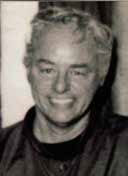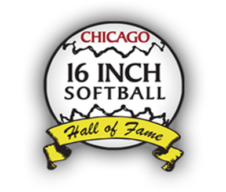Sal Novello began his softball career as a teenager on the Northwest side of Chicago at Athletic Field Park located at Addison and Drake. He formed the Addison Bears, a neighborhood team that featured the likes of John Hechinger (HOF) and Don Campbell, a power hitting infielder who later led Clarendon Park in homeruns during the’ 50s and’60s. The Bears were successful in several leagues and money tournaments on the North side. The later became the Social Athletic Club, an organization that still exists today. Sal was a fleet-footed, hard-hitting centerfielder with a strong arm. These talents were soon recognized by many veteran teams, so Sal was soon “drafted” to play for them in money games and jackpot tournaments while he was still in high school. After graduating from high school, he was given a “job” with the Northwestern Railroad so that he would be eligible to play for them. It was here that he met Mary, the woman that would be his wife for over fifty years. As a young player, he played in the prestigious Windy City League and at Northtown, Welles, Portage, and Riis Parks and at Thillens Stadium and Lane Tech Stadium. He played for the legendary Kool Vent Awnings and was routinely drafted to play in money games and leagues all over the city. He served in the Army Air Corps during World War II and represented Wright-Patterson Airfield on their baseball, basketball, and football teams. As a baseball player, he played with and against major league players. He was given a tryout with the New Your Giants and was offered a minor-league contract with them, but the small salary was not feasible for the father of two young children. After his discharge from the Army Air Corps, he returned to playing softball in every elite league and tournament all over Chicago. He switched positions to shortstop and played over fifteen years at Clarendon Park from the early ’50s until the mid ’60s. He was known as the top defensive shortstop at Clarendon. On offense, he was a slashing, line-drive hitter who could place the ball all over the field. He led his teams in batting average and was often at the top or among the top hitters at Clarendon. He played for O’Boyle Transfer, Nicky Branman’s (HOF) S&N Jewelers, Lyster’s Bakery, the Beetle Bombers, Ryan’s Jungle and others. He also played in leagues at Welles Park, at Chicago and Kedzie, at Hamlin and Kelly Parks and other during the ’50s and ’60s. Softball was four or five nights a week and with the addition of lights, he often played two games a night. Money games and round-robin “jackpot” tournaments filled most Sundays. After one profitable year playing for O’Boyle Transfer, he purchased a mink stole for his wife with the money he earned in money games and tournaments. In the mid to late ’60s, he started playing in suburban leagues closer to his home in Mt. Prospect. He played at Arlington Heights, Palatine, Rolling Meadows, Des Plaines, and Mt. Prospect. In 1968, he was recruited to play for Bob Campbell’s Bruins. They went 44-1 in 1969 and advanced to the World Tournament. Shoulder injuries forced him to give-up the game in the early ’70s, but true to the nature of a veteran softball player, he was back two years later when he joined his son’s team at Kosciuszko, Independence, and Mather Parks and in leagues in Park Ridge. By that time he was in his ’50s but still going strong. In 1983 at age sixty-two, he formed a team comprised solely of his relatives. They competed in an open league in Park Ridge. With his brother, sons, sons-in-law, and nephews at his side, Sal won his last championship there in 1985 at age sixty-four. Sal was a student of the game and a mentor to young players and veterans alike. Bob Campbell of the Bruins called him a “softball genius”. He was a fierce competitor who understood the game better than any player of his time. He never went to a tavern after a game. Instead, he would sit in the bleachers and talk about the game with players from both sides of the field. The origin of the two-strike-foul-rule is shrouded in mystery and has been credited to many players. George Morse cited Sal as one of the chief reasons for the creation of the rule. One evening he led off a game at Clarendon with fifteen foul balls while his team waited for their tenth man to arrive. Within a few days, the rule was enacted and softball was changed forever. Sal Novello was a great player, a great competitor, and a man who had an impact on the game like few others have. Sal passed away in 1993. He is survived by his widow, Mary, and his children, Donna, Tom, Nancy, Peggy, and Dean.

